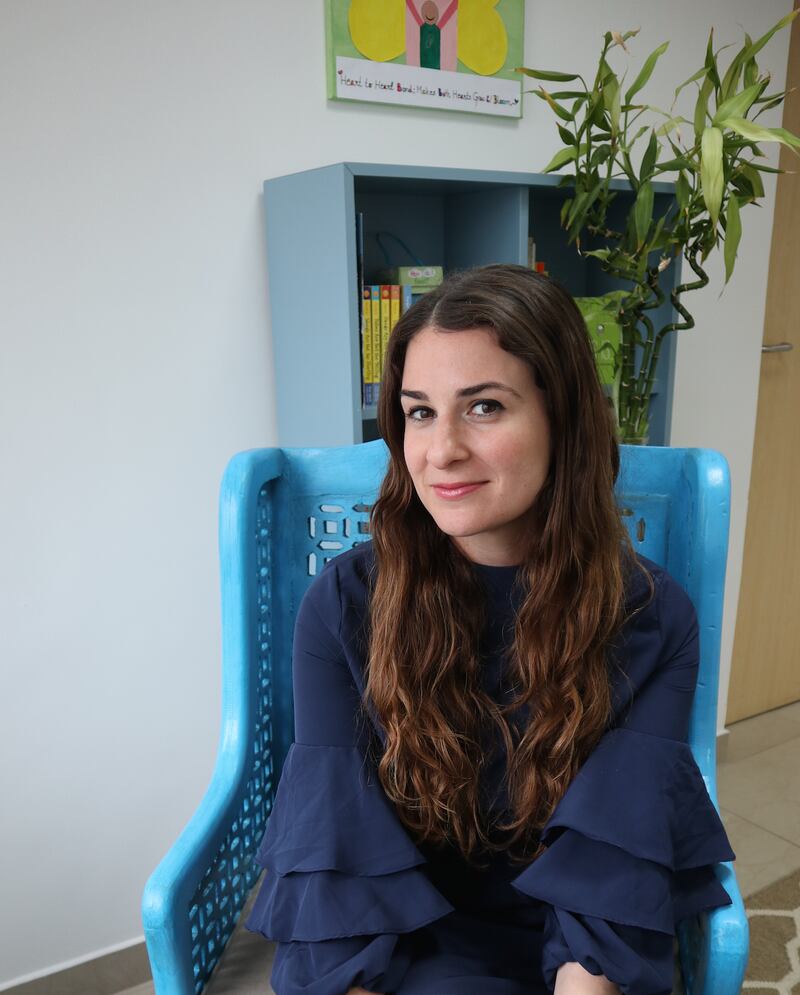If there is one thing psychologists and therapists agree on it's that there are not enough mental health workshops and services offered in Arabic, and that has to change.
One psychologist is looking to address that need. This year, Dr Sarah Rasmi set up the Dr Sarah Rasmi Wellness Centre in Dubai's Jumeirah Lake Towers area, where she plans to offer, together with other experts as part of her team, a number of courses, workshops and therapy sessions for all ages in dual languages.
On Saturday, a six-week course addressing anxiety and meant to equip participants with coping strategies to take control over their stress and worry will begin, and for the first time, it will be conducted in English and Arabic by Yusr Mahmoud, a qualified cognitive behavioural therapist from the United Kingdom. The centre also offers workshops in French, and will soon add more languages to its roster.
"There is a big need to provide services in Arabic," Rasmi says. "It is crucial to provide services in a client's preferred language, because this facilitates communication, understanding and, ultimately, effectiveness. People tend to be more comfortable thinking and speaking in their native language. This is important because communication and comfort are fundamental to the therapeutic process. Language is also inextricably linked to cultural awareness and understanding, which is a cornerstone of good practice."
Malak Kamel, a licensed counsellor and psychotherapist, says it is key to offer this type of mental health aid to clients in a language of comfort and choice. Efficacy increases two-fold, as presented in a study published by the American Psychological Association in the journal Psychotherapy: Theory, Research, Practice, Training (Vol 43, No 4).
"Other than the data and research out there, it simply makes sense – integrating clients' cultural values into therapy shows our ability to adapt mental health services to their needs – and that's what therapy should be: a client-centred experience," Kamel says. "Encouraging clients and our community to talk about mental health and wellness in our Arabic language helps break barriers about the subject and encourages us to build bridges of support and collaboration."
It's not just that there isn't support in Arabic alone, the experts say, it's that there just is not enough support when it comes to mental health globally, regardless of the language in which it is presented.
Taregh Shaban, an instructor in the psychology department at the UAE University in Al Ain and a cognitive behavioural psychotherapist, points to 2015 data released by the World Health Organisation that states that there are 0.51 psychologists and 0.3 psychiatrists per 100,000 people in the UAE. "Clearly there is a shortage of resources out there," Shaban says. "The local population deserves the best and latest evidence-based psychological therapies available."
Considering the suggested shortfall in the mental health scene in general, the situation becomes even more acute, Shaban says, when “we consider the fact that lots, but obviously not all, of the better trained psychologists and psychiatrists come from the US and the UK. These professionals are obviously English-speaking and often lack the language skills to deliver therapy in Arabic. So, if there’s a need for high-quality mental health services in general; then there’s definitely a need for such provision in Arabic”.
As for the topic of the course, according to Rasmi it was a no-brainer to begin with tackling stress and anxiety. “Stress is one of the biggest issues we are facing at the moment. People who live with chronic stress die younger, so wellbeing is linked with longevity. We need to address it swiftly and effectively given the far-reaching implications it has for individuals and communities.”
The support network that can result from a group course does wonders for dealing with and managing stress, she says. Over the next six weeks, participants will learn everything from what is a helpful worry versus a harmful one, the basics of self-care, to tackling avoidance and procrastination habits and ultimately learning to let go through mindfulness techniques.
____________________________
Read more:
A happier, healthier society means investing in people, not pills
Mental health issues need prevention and education
To tackle mental health issues, we need to focus on prevention and education
____________________________
Stress brings a lot of baggage along with it: serious cognitive, emotional, physical and behavioural implications come hand-in-hand with chronic stress. “People who are stressed out experience impairments to their memory, judgment and decision-making,” Rasmi says. “They also have difficulty focusing.”
On an emotional level, people who are stressed are more likely to experience moodiness and panic; they are also more likely to feel overwhelmed and frustrated. On a physical level, people who are struggling with stress often experience aches and pains, complain of chest pains, and have digestive issues. On a behavioural level, stress can lead to social withdrawal and sleep issues. And yet there are ways to manage and reduce stress.
“People in the UAE, like everywhere in the world, face stress in their daily lives,” Rasmi says.
“It can be exacerbated by the busy, fast-paced lifestyle that many of us lead here in the UAE. Another issue is that many expats here have fewer support networks than they would have in their home country.”
The six-week stress and anxiety course begins on Saturday and costs Dh950. The course will be held in English in the mornings (from 10am), and Arabic in the afternoons (from 1pm). Go to www.drsarahrasmi.com






